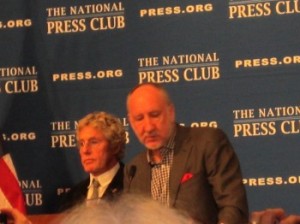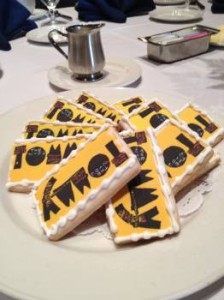 I got to hear The Who’s Roger Daltrey and Pete Townsend speak at the National Press Club today, which saluted them with “Tommy” cookies. They were there on behalf of the Teenage Cancer Trust, a non-profit devoted to improving the way young people with cancer and their families are treated and supported. “There’s a huge gap in the health care system,” Daltrey said. There are facilities for children and adults, but “teenagers don’t want teddy bears.” If businesses, who see teenagers as a lucrative market, recognize that they are unique, so should the medical establishment. They may need the same medicine, but their psychological, emotional, and social needs are different.”They love to be together,” he said. “We try to make their lives as normal as possible.” He told us about touring an impressive hospital facility that was “nicer than some of the hotels we stay in,” with atriums and palm trees. “But I did not see one square foot of space where a teenager could be happy.” A place for parents to stay and get support is also important.
I got to hear The Who’s Roger Daltrey and Pete Townsend speak at the National Press Club today, which saluted them with “Tommy” cookies. They were there on behalf of the Teenage Cancer Trust, a non-profit devoted to improving the way young people with cancer and their families are treated and supported. “There’s a huge gap in the health care system,” Daltrey said. There are facilities for children and adults, but “teenagers don’t want teddy bears.” If businesses, who see teenagers as a lucrative market, recognize that they are unique, so should the medical establishment. They may need the same medicine, but their psychological, emotional, and social needs are different.”They love to be together,” he said. “We try to make their lives as normal as possible.” He told us about touring an impressive hospital facility that was “nicer than some of the hotels we stay in,” with atriums and palm trees. “But I did not see one square foot of space where a teenager could be happy.” A place for parents to stay and get support is also important.
The UK program has led to a 10-15% improvement in survival rates. “If you had a drug that made that kind of difference, they would throw billions at you.”
He hopes to promote a more comprehensive clinical recognition of the unique needs of teenagers, who often receive later diagnoses than they should because doctors are not looking for cancer. Their successful UK program is expanding to the US with the first program at UCLA and conversations underway with other hospitals. Daltrey is deeply involved as a passionate advocate and as a fundraiser, persuading other rock stars to help out by reminding them that “the music business would not exist without teenagers.”
Daltrey and Townsend good-naturedly answered questions about music, though they said performing for the teens in the program was not on the agenda. “We might kill off the rest of the hospital.” Townsend declined to say whether current music was better or worse than the music of the Woodstock era. “‘Classic rock’ is a term made up by radio DJs to sell advertising,” he said. “The continuum is the teen we all carry inside us.”



